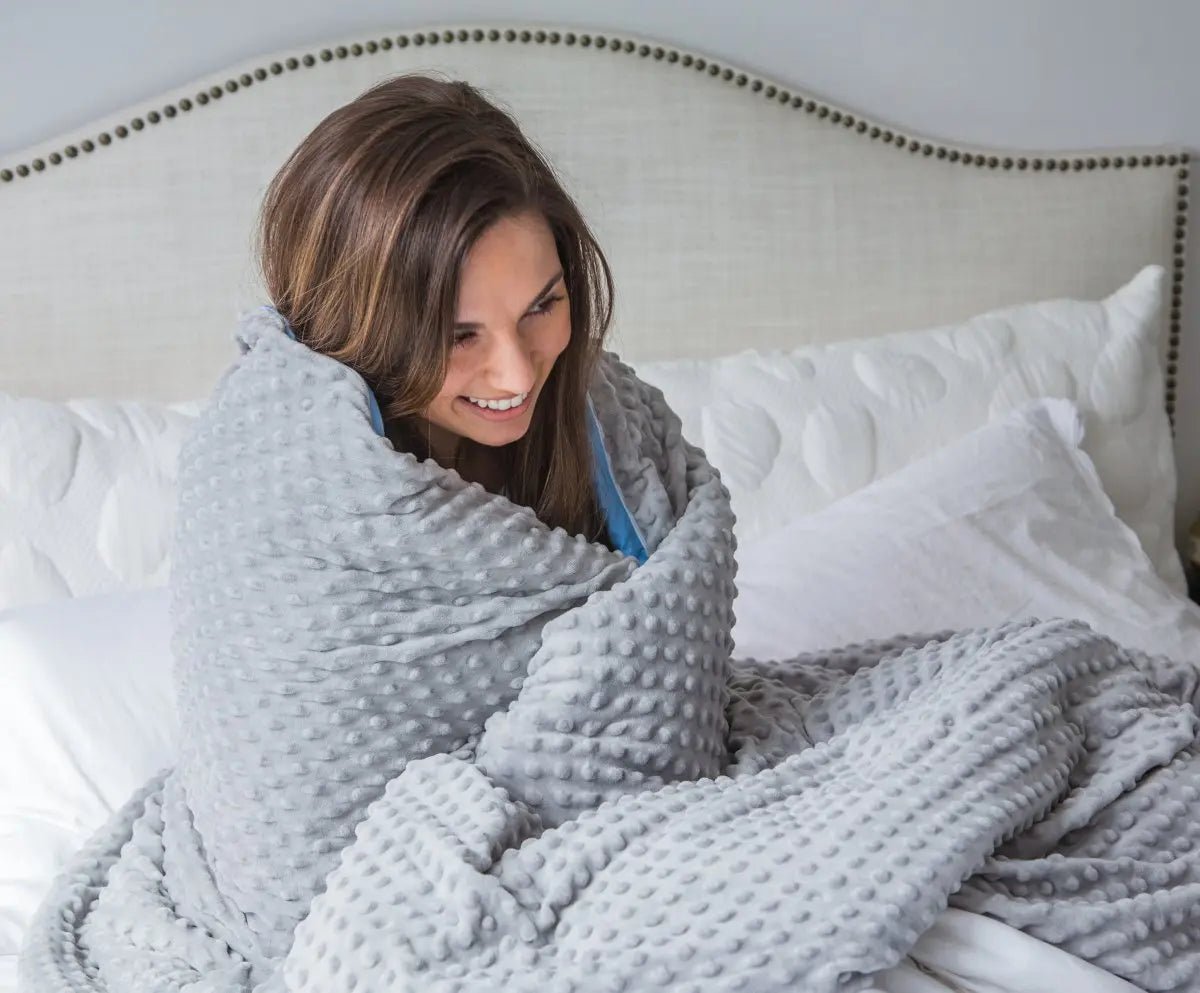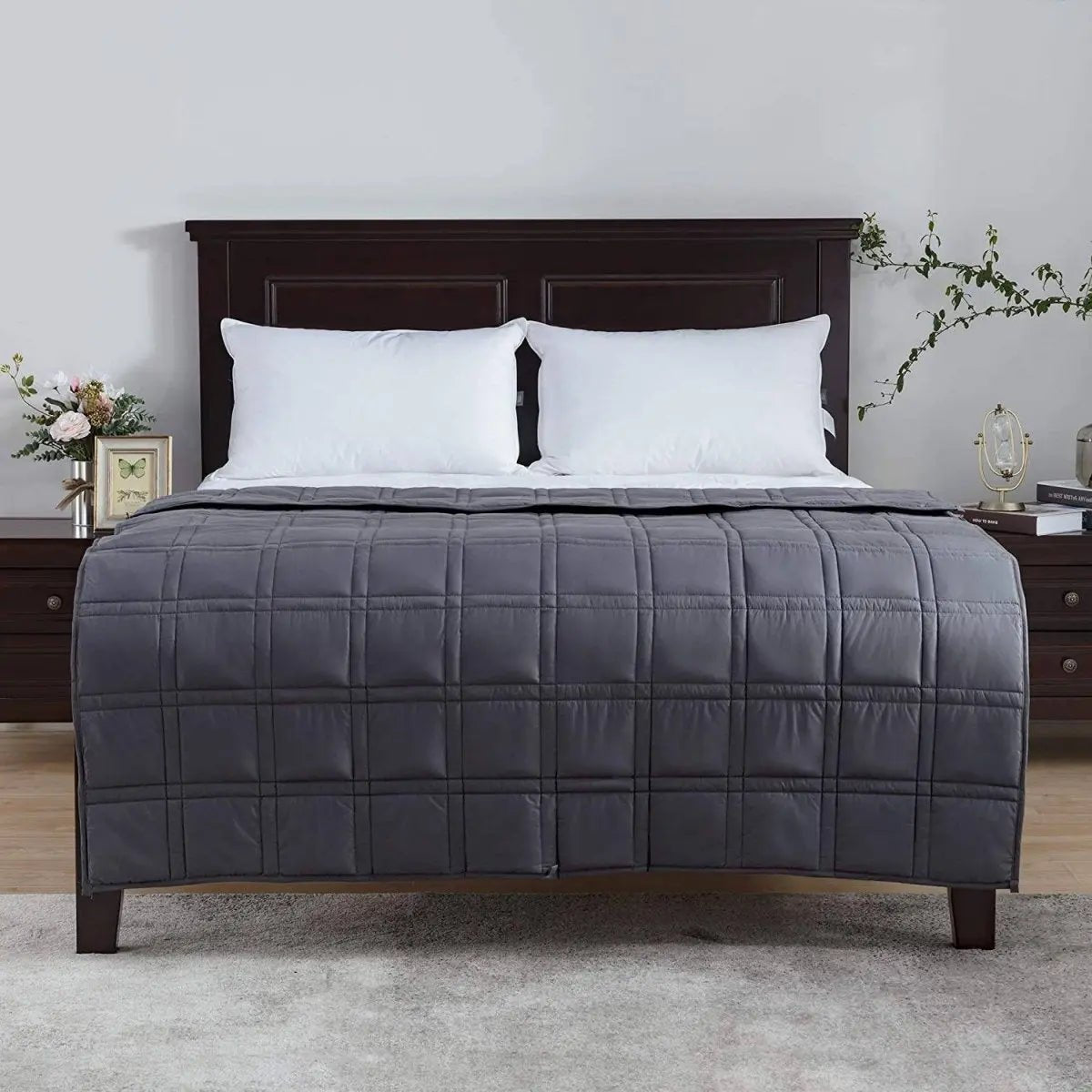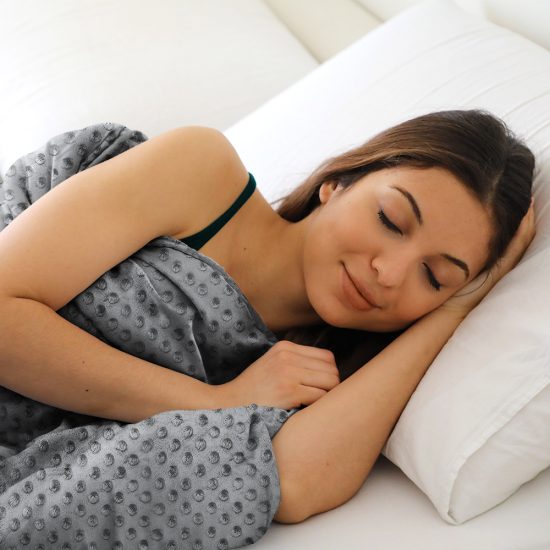Is there anyone who should not use a weighted blanket?Read Now
Introduction: Exploring The Therapeutic Benefits Of Weighted Blankets
Weighted blankets have gained significant popularity in recent years for their potential therapeutic benefits. These blankets are specially designed to be heavier than traditional bedding, ranging from 5 to 35 pounds. The additional weight creates a gentle pressure that mimics the sensation of being hugged or held, providing a comforting and calming effect.

One primary application of weighted blankets is in the realm of mental health. Research suggests that the deep touch pressure provided by these blankets can stimulate the release of serotonin, a neurotransmitter associated with mood regulation and relaxation. As a result, individuals struggling with anxiety, stress, or insomnia may find relief when using weighted blankets. Moreover, weighted blankets have shown promise in managing certain sensory processing disorders like autism spectrum disorder and attention deficit hyperactivity disorder (ADHD).
Occupational therapists often recommend these blankets as part of sensory integration therapy to help individuals regulate their sensory input and improve focus. While weighted blankets offer numerous potential benefits, it is important to note that they may not be suitable for everyone. In this article, we will explore who can benefit from using weighted blankets and discuss any potential considerations or limitations associated with their use.
Understanding The Science Behind Weighted Blankets And Their Effectiveness
Weighted blankets have gained popularity in recent years as a non-pharmacological intervention for sleep and anxiety disorders. The science behind their effectiveness lies in the concept of deep pressure stimulation (DPS). DPS is a therapeutic technique that applies gentle, distributed pressure to the body, triggering a calming response.
When using a weighted blanket, the added weight evenly distributes pressure across the body, which can stimulate the release of neurotransmitters like serotonin and dopamine. These neurotransmitters play crucial roles in regulating mood and promoting relaxation. Serotonin, often referred to as the "feel-good" hormone, helps reduce anxiety levels and promotes better sleep quality.
Furthermore, research suggests that DPS provided by weighted blankets may also activate the parasympathetic nervous system. This system is responsible for initiating the body's relaxation response by slowing heart rate, reducing blood pressure, and promoting overall physiological calmness.
It is important to note that while weighted blankets offer potential benefits for many individuals, they may not be suitable for everyone. Individuals with certain medical conditions such as respiratory issues or mobility limitations should consult with a healthcare professional before using a weighted blanket.
Overall, understanding the science behind weighted blankets highlights their potential effectiveness in promoting relaxation and improving sleep quality through deep pressure stimulation.
Weighted Blankets For Autism Spectrum Disorder: A Promising Tool For Sensory Regulation
Weighted blankets have gained significant attention as a potential therapeutic tool for individuals with Autism Spectrum Disorder (ASD). ASD is a neurodevelopmental disorder characterized by difficulties in social interaction, communication, and repetitive behaviors. Sensory regulation is a common challenge faced by individuals with ASD, where they may experience hypersensitivity or hyposensitivity to sensory stimuli.

Research suggests that weighted blankets can be an effective intervention to address sensory regulation difficulties in individuals with ASD. The deep pressure provided by the weighted blanket has a calming effect on the nervous system, promoting relaxation and reducing anxiety. It helps modulate sensory input, potentially decreasing sensitivity to external stimuli and improving focus.
Several studies have reported positive outcomes when using weighted blankets with individuals on the autism spectrum. These outcomes include improved sleep quality, reduced restlessness, decreased repetitive behaviors, and enhanced overall well-being. Weighted blankets are also non-invasive and easily accessible, making them a practical tool for everyday use.
While further research is needed to better understand the specific mechanisms underlying their effectiveness and optimal implementation strategies, weighted blankets offer promising potential as a safe and non-pharmacological option for promoting sensory regulation in individuals with ASD.
Managing Adhd Symptoms With Weighted Blankets: Examining The Evidence
Attention-Deficit/Hyperactivity Disorder (ADHD) is a neurodevelopmental disorder characterized by difficulties in sustaining attention, hyperactivity, and impulsivity. While traditional treatment approaches such as medication and therapy remain the cornerstone of managing ADHD symptoms, alternative interventions are being explored. One such intervention gaining attention is the use of weighted blankets. Weighted blankets are designed to provide deep pressure stimulation, which may help individuals with ADHD to calm down and focus better.
The theory behind their effectiveness lies in their ability to activate the body's sensory system, promoting a sense of security and reducing anxiety. Though anecdotal reports have suggested positive outcomes for individuals with ADHD using weighted blankets, scientific research on this topic is limited. However, preliminary studies have shown promising results. A study published in the Journal of Sleep Medicine & Disorders found that participants who used a weighted blanket experienced improved sleep quality and reduced anxiety levels.
Another study published in Occupational Therapy in Mental Health examined the effects of weighted vests and blankets on children with ADHD during classroom activities. The researchers reported that both vests and blankets had a positive impact on attention span, focus, and task completion. While these initial findings are encouraging, further research is needed to establish the efficacy of weighted blankets specifically for managing ADHD symptoms.
Exploring The Potential Benefits Of Weighted Blankets For Elderly Individuals
Weighted blankets have gained popularity in recent years due to their potential benefits for individuals seeking relaxation and improved sleep. However, it is crucial to examine whether these therapeutic blankets can also be beneficial for elderly individuals. One potential benefit of weighted blankets for the elderly is the promotion of a sense of security and calmness. As people age, they may experience increased anxiety, restlessness, or difficulty falling asleep.

The deep pressure stimulation provided by weighted blankets can potentially help soothe these symptoms, allowing older adults to feel more relaxed and at ease. Furthermore, weighted blankets may assist in managing certain age-related conditions such as arthritis or chronic pain. The gentle pressure exerted by the blanket can potentially alleviate joint discomfort and muscle tension, providing relief to seniors who often suffer from these ailments.
Moreover, weighted blankets may contribute to improving sleep quality among older adults. Many elderly individuals struggle with insomnia or frequently waking up during the night. The added weight of the blanket can potentially enhance proprioception (body awareness) and increase serotonin production, which aids in regulating sleep patterns.
Fibromyalgia Relief: Can Weighted Blankets Help Alleviate Chronic Pain?
Fibromyalgia, a chronic pain condition characterized by widespread musculoskeletal discomfort and fatigue, affects millions of people worldwide. Those living with fibromyalgia often seek various methods to manage their symptoms and improve their quality of life. Weighted blankets have emerged as a potential solution in recent years, but can they truly provide relief for fibromyalgia sufferers?
Research suggests that weighted blankets may offer benefits for individuals with fibromyalgia. The deep pressure stimulation provided by these blankets has been found to increase the production of serotonin and dopamine, neurotransmitters responsible for regulating mood and pain perception. This effect can potentially reduce the intensity of pain experienced by those with fibromyalgia. Furthermore, the gentle pressure exerted by weighted blankets may promote relaxation and improve sleep quality – factors that are crucial for individuals battling chronic pain conditions like fibromyalgia.
Enhanced sleep can lead to reduced fatigue levels and better overall well-being. However, it is important to note that while some fibromyalgia patients report positive outcomes from using weighted blankets, results vary from person to person. It is recommended that individuals consult with their healthcare provider before incorporating a weighted blanket into their pain management routine.
Addressing Concerns And Considerations: Who Should Avoid Using A Weighted Blanket?
While weighted blankets can provide numerous benefits for many individuals, it is important to acknowledge that they may not be suitable for everyone. Certain individuals should exercise caution or avoid using weighted blankets altogether due to specific health conditions or circumstances.

Firstly, children under the age of two should not use weighted blankets as they may pose a suffocation risk. Additionally, individuals with respiratory conditions such as asthma or chronic obstructive pulmonary disease (COPD) should consult with a healthcare professional before using a weighted blanket. The added weight could potentially restrict breathing and exacerbate these conditions.
Furthermore, those with claustrophobia or sensory processing disorders may find the pressure from a weighted blanket overwhelming rather than comforting. It is crucial for individuals with such conditions to carefully assess their tolerance levels before incorporating a weighted blanket into their sleep routine.
Additionally, anyone experiencing an acute medical condition, fever, open wounds, or skin irritations should refrain from using a weighted blanket until their condition improves. In such cases, the added pressure from the blanket could potentially exacerbate symptoms or hinder the healing process.
Ultimately, it is essential for individuals to consider their unique circumstances and consult with healthcare professionals if they have any concerns about whether using a weighted blanket is appropriate for them.
Choosing The Right Weight And Size For Maximum Comfort And Effectiveness
When it comes to experiencing the benefits of a weighted blanket, choosing the right weight and size is crucial for achieving maximum comfort and effectiveness. While weighted blankets are generally safe for most individuals, it is important to consider personal preferences and physical characteristics.
The general rule of thumb for selecting an appropriate weight is to choose one that is around 10% of your body weight. For example, if you weigh 150 pounds, a 15-pound blanket would be suitable. However, this guideline may vary depending on individual needs and preferences. Some people may prefer a slightly heavier or lighter blanket.
Additionally, considering the size of the blanket is essential in ensuring proper coverage and ease of use. Weighted blankets should typically cover your entire body without hanging off the edges excessively. Opting for a size that matches your bed dimensions or one that fits snugly around your body can enhance comfort levels.
Ultimately, finding the perfect weight and size combination will ensure that your weighted blanket provides optimal comfort, promotes relaxation, reduces anxiety, improves sleep quality, and enhances overall well-being.
Conclusion: Unlocking The Potential Of Weighted Blankets For Enhanced Well-Being
Weighted blankets have gained significant attention in recent years as a potential tool for enhancing well-being. While they are not suitable for everyone, their benefits cannot be overlooked. These therapeutic blankets provide deep pressure stimulation, which has been found to promote relaxation and alleviate symptoms associated with anxiety, insomnia, and certain sensory disorders. Weighted blankets have demonstrated their efficacy in improving sleep quality by increasing melatonin production and reducing cortisol levels.

Moreover, they have shown promising results in managing symptoms related to attention deficit hyperactivity disorder (ADHD) and post-traumatic stress disorder (PTSD). The comforting weight of these blankets may also enhance feelings of security and reduce restlessness.
However, it is important to consider individual needs and preferences when using weighted blankets. Some individuals may find the weight uncomfortable or excessive, while others may experience difficulty regulating their body temperature under the blanket's warmth.
Additionally, individuals with certain medical conditions or physical limitations should consult with a healthcare professional before using a weighted blanket. In conclusion, weighted blankets hold great potential for enhancing well-being by promoting relaxation, improving sleep quality, and managing various psychological conditions.












Leave a comment